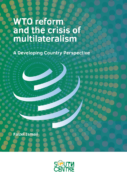Trade War
Trump and the Return of the Nation-State: Hegemony and Crisis of the Neoliberal Global Order
By Humberto Campodonico
This article examines the deepening crisis of the global economic and trade order established after World War II, a crisis accelerated by Donald Trump’s return to the United States presidency. Trump has adopted a stance openly hostile to neoliberal globalization, promoting instead a project centered on reinforcing the nation-state, employing commercial coercion, and using economic power to preserve US hegemony by neutralizing China. His “reciprocal tariffs” and the “Big Beautiful Bill” illustrate this shift, breaking with the World Trade Organization and consolidating elite power while sharply reducing social spending. Far from correcting the inequities of neoliberal globalization, these measures channel the social dislocations of deindustrialization and the impoverishment of the US Rust Belt into an authoritarian discourse of economic sovereignty.
The article situates this process within the broader crisis of democratic capitalism, marked by declining trust in liberal democracy and the rise of populisms and authoritarian regimes that capitalize on discontent without offering redistributive solutions. The analysis draws on Graham Allison’s “Thucydides Trap” and Carla Norrlöf’s reading of Ibn Khaldun to explain both hegemonic rivalry and internal fragmentation. Finally, it explores alternatives to the failed neoliberal order and argues for opening a collective debate on a new international system in which the Global South must play a role.
(more…)
Global Cooperation Instead of Confrontation
By Peter Lunenborg and Fernando Rosales
The world faces many challenges besides the current coronavirus pandemic, including hunger, environmental destruction, climate change, the proliferation of nuclear weapons and rising inequality. Global cooperation is necessary to address these challenges and, in some areas, the global community is responding to them. Calls to form a coalition against a particular country, such as from the United States towards China, divert attention from the problems the world is facing and hamper progress in addressing these global challenges. History taught us that the best way to resolve our differences and to move forward is through dialogue and cooperation, not confrontation.
(more…)
WTO reform and the crisis of multilateralism – A Developing Country Perspective
 About the Book:
About the Book:
The WTO has not been able to recover since the collapse of the Doha Round in July 2008. Several ministerial conferences including the Buenos Aires meeting in December 2017 failed to reach agreement. The US Trump Administration launched a campaign to reform the WTO in 2018 and 2019. This book argues that the Trump Administration reform proposals have been much more aggressive and far-reaching than the Obama Administration before it, threatening to erode hard-won special and differential treatment rights of developing countries. By blocking the appointment of new Appellate Body members, the US has effectively paralysed the Appellate Body and deepened the crisis of the multilateral trading system. Developing countries have responded to the proposals and called for the WTO to be development-oriented and inclusive. This book provides a critical analysis of the US-led reform proposals and seeks to build a discourse around an alternative set of concepts or principles to guide the multilateral trading system based on fairness, solidarity, social justice, inclusiveness and sustainability.
Author: Faizel Ismail served as the Ambassador Permanent Representative of South Africa to the WTO (2010-2014).
(more…)
US-China trade deal: preliminary analysis of the text from WTO perspective
By Peter Lunenborg
The long-awaited ‘Phase 1’ trade deal between the United States and China, officially termed the ‘Economic and Trade Agreement between the Government of the United States of America and the Government of the People’s Republic of China’, was signed on 15 January 2020. It will enter into force on Valentine’s Day, on Friday, 14 February 2020. This deal is a result of US exercise of political power and unilateral World Trade Organization (WTO)-inconsistent tariffs in order to extract trade concessions, an expression of the most pure protectionism that the WTO is supposed to prevent. Nevertheless, the WTO was unhelpful in addressing the US economic aggression against China. This failure to protect a Member from illegitimate unilateral measures is, perhaps, one of the most significant manifestations of the often-mentioned ‘crisis’ of the WTO, and actually is one of the subjects on which the proposed ‘reform’ of the organization should focus.
(more…)













 About the Book:
About the Book: